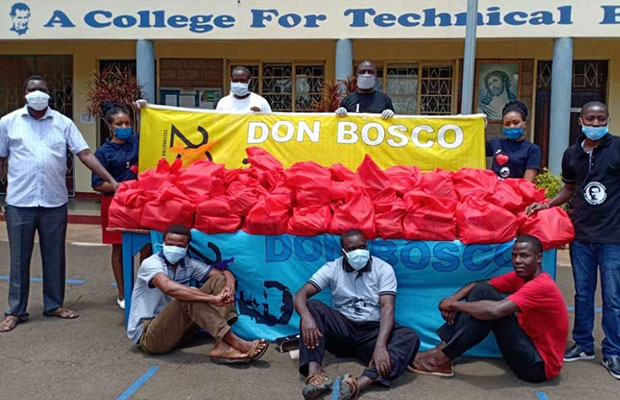
A Missionary’s Dream Paves the Way for Nairobi’s Youth
When Father Sean McFarran founded Don Bosco Boys Town in Nairobi, he hoped to inspire marginalized youth in Kenya to look beyond their circumstances; maybe even to encourage a few to seek secondary education. He likely never imagined that he would create a lasting legacy comprising over 6,000 successful graduates to date.
In 1985, Don Bosco Boys Town first opened its doors to the poorest of the poor—teaching students whose parents couldn’t even afford the modest fees of government-sponsored education. In collaboration with then-Archbishop of Nairobi, Cardinal Maurice Michael Otunga—who gave land to Salesian missionaries for the specific purpose of educating Nairobi’s impoverished youth—Fr. Sean and his co-founder Brother Joseph Cherian opened the school in one the city’s most affluent suburbs. Their hope? To call attention to the plight of youth living in the slums, and inspire wealthy residents to support Don Bosco’s mission.
That strategy paid off. From its modest beginnings in a makeshift, tin-roofed shed, Don Bosco Boys Town developed into a bona fide institution offering primary, secondary and technical education. The institution grew to accommodate 250 students in a two-year vocational training program designed to prepare youth for in-demand jobs and long-term employment.
During the past 35 years, this need has grown exponentially. Despite Kenya’s free educational model, close to 90 percent of children from the country’s poorest households fail to complete their basic schooling. In Nairobi’s slums especially, families barely scraping by on less than $1 per day simply can’t afford associated school fees. Out-of-school youth then become vulnerable to exploitation, forced labor and other abuses that further drive them into the trap of generational poverty.
Despite Kenya’s recent and rapid economic growth, “nearly two million of Nairobi’s three million residents still live in impoverished informal settlements,” explains Fr. Gus Baek, director of Salesian Missions. “That’s approaching 70 percent of the city’s population. More than ever, poor youth desperately need access to basic and technical education in order to turn their lives around—and this is where Don Bosco Town continues to shine.” (In the 1990s, administrators dropped “Boys” from the name to reflect the fact that girls were now also welcome to learn and train for better futures there).
For families who can’t afford to send their children to school—or who need them to help earn money for food instead—Don Bosco Town offers a viable alternative. Each year, nearly 600 students of all ages benefit from this choice.
Today, young men and women between the ages of 18-22 can enroll in a variety of training programs including tailoring, auto mechanics, carpentry, electrical work and welding, secretarial skills, and a full spectrum of computer-related classes. After they graduate, students have the option to pursue additional schooling or take advantage of job placement services. Many choose to continue their education at the nearby Don Bosco Technical Secondary School, while others enroll in specific job training programs that suit their needs and chosen career paths. Younger children who attend primary school receive comprehensive support throughout, with teachers and staff guiding them toward a traditional high school education or a vocational training program, depending on the students’ interests, aptitudes and needs.
In the 35 years since its founding, Don Bosco Town has graduated more than 6,000 young men and women—nearly 80 percent of whom have found employment in their fields of study. Compared to Nairobi’s population, this may seem a drop in the bucket; but “reversing the tide of poverty and despair happens one student at a time,” says Fr. Gus.
And there’s a ripple effect, too. In the spirit of Fr. Sean, whose unwavering passion to ease suffering among the poor brought him to Kenya at the age of 66, many graduates choose to use their education to give back to their communities. They return to Nairobi—as CEOs and entrepreneurs—creating business ventures to benefit those living in the slums … just as they once did.
A truly remarkable legacy that endures today. On January 19, Don Bosco Town welcomed its 36th class of future success stories to its COVID-safe campus. Fr. Sean would be proud!
Our mission transforms the lives of impoverished youth and their families through education. What’s your mission?
Learn more about our work in Kenya.

